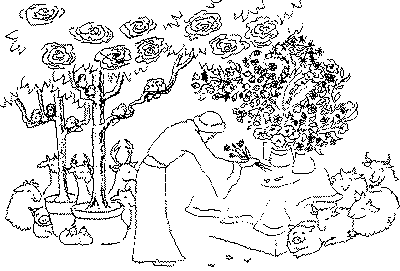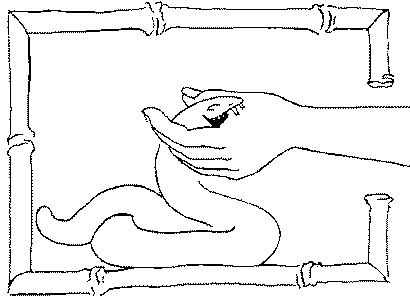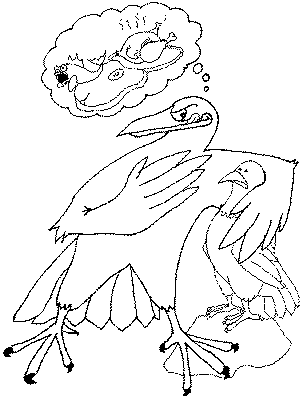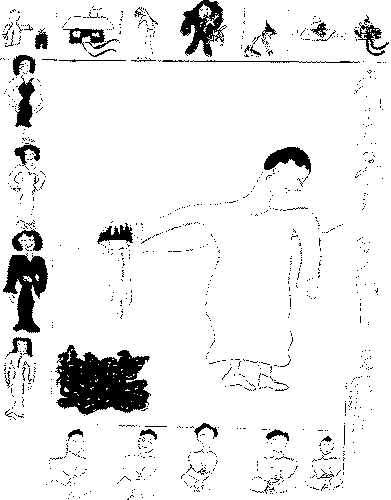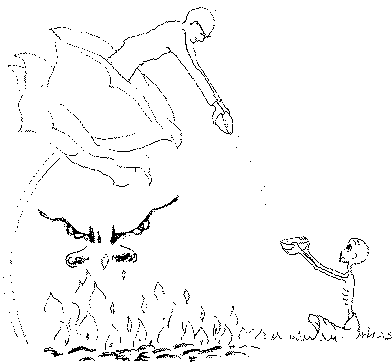
38. The Crane and the Crab [Trickery]
Buddhist Tales for Young and Old, volume 1, Prince Goodspeaker, Stories 1-50
Once upon a time, there was a crane who lived near a small pond. Right next to the pond was a big tree with a fairy living in it. He learned by observing the various animals.
There were also many small fish living in the small pond. The crane was in the habit of picking up fish with his beak and eating them. Since there happened to be a drought in the area, the water level in the pond was becoming lower and lower. This made it easier for the crane to catch fish. In fact, he was even getting to be a little fat!
However, the crane discovered that no matter how easy it was to catch fish, and no matter how many he ate, he was never completely satisfied. But he did not learn from this. Instead, he decided that if he ate all the fish in the pond, then he would find true happiness. “The more the merrier!" he said to himself.
In order to catch all the fish in the pond, the crane thought up a clever plan. He would trick the fish, and deceive them into trusting him. Then when they trusted him the most, he would gobble them up. He was very pleased with himself for thinking up such a trick.
To begin with, the crane sat down on the shore. He remained quietly in one position, just like a holy man in the forest. This was intended to get the fish to trust him.
The fish came to him and asked. “Sir crane, what are you thinking?" The holy-looking crane answered, “Oh my dear fish, it makes me sad to think of your future. I am thinking about the coming miserable disaster."
They said, “My lord, what disaster is coming to us?" To which the crane replied, “Look around you! There is very little water left in this pond. You are also running out of food to eat. This severe drought is very dangerous for you poor little ones."
Then the fish asked, “Dear uncle crane, what can we do to save ourselves?" “My poor little children," said the crane, “you must trust me and do as I say. If you allow me to pick you up in my beak, I will take you, one at a time to another pond. That pond is much bigger than this one. It is filled with water and covered with lovely lotuses. It will be like a paradise for you!"
When they heard the part about the beak, the fish became a little suspicious. They said, “Mr. Crane, how can we believe you? Since the beginning of the world, there has never been a crane who wanted to help fish. Cranes have put fish in their beaks only to eat them. This must be a trick. Or else you must be joking!"
The crane then raised his head and made himself look as dignified as possible. He said, “Please don’t think such a thing. Can’t you see that I am a very special crane? You should trust me. But if you don’t believe me, send one fish with me and I will show him the beautiful pond. Then when I bring him back here, you will know I can be trusted."
The fish said to each other, “This crane looks so dignified. He sounds like an honest crane. But just in case it’s a trick, let us send with him a useless little troublemaker fish. This will be a test." Then they found a young fish who was known for playing hooky from school. They pushed him towards the shore.
The crane bent his head and picked up the little one in his beak. Then he spread his wings and flew to a big tree on the shore of a beautiful big pond. Just as he had said, it was covered with lovely lotuses. The fish was amazed to see such a wonderful place. Then the crane carried him back to his poor old pond, just as he had promised.
Arriving home, the little fish described the wonders of the beautiful big pond. Hearing this, all the other fish became very excited and rushed to be the first to go.
The first lucky passenger was that same useless little troublemaker. Again the crane picked him up in his beak and flew to the big tree on the shore of the beautiful new pond. The little one was sure the helpful crane was about to drop him into the wonderful pond. But instead, the crane suddenly killed him, gobbled up his flesh, and let the bones fall to the ground.
The crane returned to the old pond, brought the next little fish to the same tree, and ate him in the same way. Likewise, one by one, he gobbled up every last fish!
He became so stuffed with fish meat that he had trouble flying back to the little pond. He saw that there were no more fish left for him to trick and eat. Then he noticed a lonely crab crawling along the muddy shore. And he realized that he was still not completely satisfied!
So he walked over to the crab and said, “My dear crab, I have kindly carried all the fish to a wonderful big pond not far from here. Why do you wish to remain here alone? If you simply do as the fish have done, and let me pick you up in my beak, I will gladly take you there. For your own good, please trust me."
But the crab thought, “There is no doubt this over-stuffed crane has eaten all those fish. His belly is so full he can hardly stand up straight. He definitely cannot be trusted! If I can get him to carry me to a new pond and put me in it, so much the better. But if he tries to eat me, I will have to cut off his head with my sharp claws."
Then the crab said, “My friend crane, I am afraid I am much too heavy for you to carry in your beak. You would surely drop me along the way. Instead, I will grab onto your neck with my eight legs, and then you can safely carry me to my new home."
The crane was so used to playing tricks on others, that he did not imagine he would be in any danger — even though the crab would be grasping him by the throat. Instead he thought, “Excellent! This will give me a chance to eat the sweet meat of this foolish trusting crab."
So the crane permitted the crab to grab onto his neck with all eight legs. In addition, he grasped the crane’s neck with his sharp claws. He said, “Now kindly take me to the new pond."
The foolish crane, with his neck in the clutches of the crab, flew to the same big tree next to the new pond.
Then the crab said, “Hey you stupid crane, have you lost your way? You have not taken me to the pond. Why don’t you take me to the shore and put me in?"
The crane said, “Who are you calling stupid? I don’t have to take that from you. You’re not my relative. I suppose you thought you tricked me into giving you a free ride. But I’m the clever one. Just look at all those fish bones under this tree. I’ve eaten all the fish, and now I’m going to eat you too, you stupid crab!"
The crab replied, “Those fish were eaten because they were foolish enough to trust you. But no one would trust you now. Because you tricked the fish, you have become so conceited you think you can trick anyone. But you can’t fool me. I have you by the throat. So if one dies, we both die!"
Then the crane realized the danger he was in. He begged the crab, “Oh my lord crab, please release me. I have learned my lesson. You can trust me. I have no desire to eat such a handsome crab as you."
Then he flew down to the shore and continued, “Now please release me. For your own good, please trust me."
But this old crab had been around. He realized the crane could not be trusted no matter what he said. He knew that if he let go of the crane, he would be eaten for sure. So he cut through his neck with his claws, just like a knife through butter! And the crane’s head fell on the ground. Then the crab crawled safely into the wonderful pond.
Meanwhile, the inquisitive fairy had also come to the new pond and seen all that had happened. Sitting on the very top of the big tree, he said for all the gods to hear:
“The one who lived by tricks and lies,
No longer trusted now he dies."
The moral is: The trickster who can’t be trusted, has played his last trick.
38. The Crane and the Crab [Trickery]
Link: https://hhdorjechangbuddhaiiiinfo.com/2022/10/04/the-crane-and-the-crab-trickery/
INTERPRETER’S INTRODUCTION – BUDDHIST TALES FOR YOUNG AND OLD, VOLUME 1, STORIES 1-50
#Buddhisttalesforyoungandold #Buddhiststories #storiesforkids #moralstories #Buddha #Jatakastories #PansiyaPanasJataka#PrinceGoodspeaker
